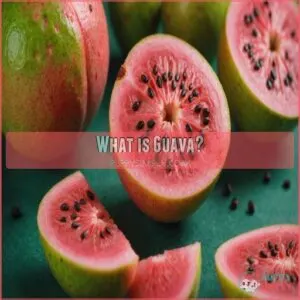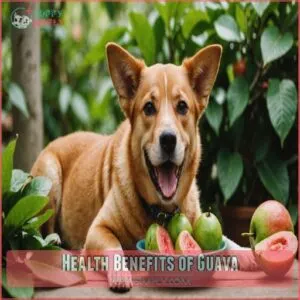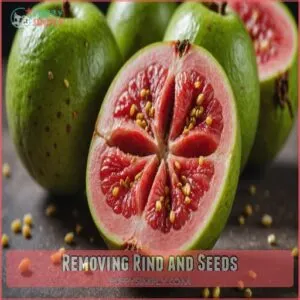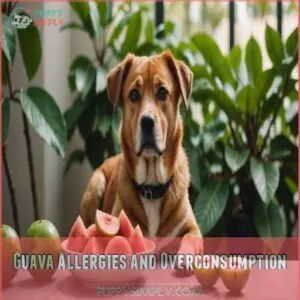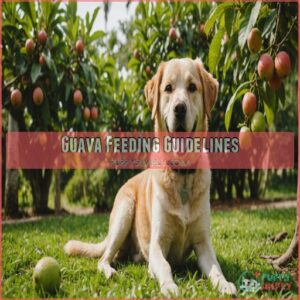This site is supported by our readers. We may earn a commission, at no cost to you, if you purchase through links.

A little guava can be a tasty treat, offering vitamins and fiber.
But too much sugar might pack on the pounds – think of it like a doggy dessert, not a main course.
Remember to remove the rind and seeds before offering any guava to your furry friend, as they can be a choking hazard.
While most dogs tolerate guava well, keep an eye out for any allergic reactions.
Want to know which other fruits are safe (and which ones to avoid completely)? Read on to discover more fruity facts!
Table Of Contents
- Key Takeaways
- What is Guava?
- Is Guava Safe for Dogs?
- Health Benefits of Guava
- How to Feed Guava to Your Dog
- Other Dog-Friendly Fruits
- Fruits Toxic to Dogs
- Fruits to Be Wary Of
- Guava Allergies and Overconsumption
- Guava Feeding Guidelines
- Frequently Asked Questions (FAQs)
- Can dogs eat guava?
- Can one eat guava skin?
- How much guava should a dog eat a day?
- Can dogs get Parvo if they eat guava leaves?
- Are guavas toxic to dogs?
- Are any fruits poisonous to dogs?
- Who should not eat guava?
- Are the seeds in guava edible?
- Can guava be given to puppies safely?
- How often can dogs eat guava?
- Are guava leaves bad for dogs?
- What are symptoms of guava allergies?
- Can guava treat specific health issues in dogs?
- Conclusion
Key Takeaways
- You can feed your dog guava, but when choosing a variety, consider safe guava types, but remember to remove the seeds and rind to prevent choking hazards.
- Guava offers vitamins and fiber, supporting your dog’s digestion and immune system. Keep servings small to avoid weight gain.
- Watch for any allergic reactions, such as itching or hives, especially when giving guava for the first time.
- Introduce guava to your furry friend’s diet only after consulting your vet to ensure safety and dietary compatibility.
What is Guava?
Imagine you’re wandering through a tropical market, and you stumble upon the guava, a fruit that’s surprisingly versatile and delightful.
With its origins in Central America, guava has traveled far and wide.
It’s now enjoyed in countless guava varieties, like the creamy white, sweet pink, or even the crunchy Thai kind.
Guavas offer a symphony of taste – some are sweet and fragrant, with a hint of musk and bubblegum, while others pack a tangy punch.
When considering guava safety for dogs, you should note that only the flesh is safe for consumption.
The texture ranges from smooth to gritty, almost like a pear or apple but with its own unique twist.
Guavas aren’t just about snacking; they’re also starring in smoothies, salads, and savory dishes.
But here’s a nugget: they’re not just for us humans.
You might wonder, “Can dogs eat guava?”
While that’s another tale to tell, rest assured, this tropical wonder has more than one trick up its sleeve!
Is Guava Safe for Dogs?
You might be wondering if guava is a safe treat for your dog, and just like how poodles can safely eat bananas in moderation as part of a balanced diet, receiving benefits like potassium and fiber, bananas for dogs. and the good news is that it can be, as long as you follow a few simple guidelines.
Just remember to remove the seeds and rind to avoid any digestive issues.
And consult your vet before introducing this fruit to your furry friend’s diet.
Guava Basics and Safety
So, you’ve learned about guavas. Now, let’s talk safety!
Yes, your dog can enjoy guava, but only the flesh – remove the skin and seeds.
Just like with asparagus, always check for allergic reactions.
A little guava is fine, but too much can cause tummy troubles.
Remember, moderation is key with guava and weight management.
Always check with your vet before adding new foods, especially for puppies or pregnant dogs.
Guava preparation is simple; just chop it up!
Proper guava storage keeps it fresh.
Toxic Parts of Guava
While guava offers benefits for dogs, it’s not all sunshine and rainbows.
The guava seeds, leaves, rind, buds, and stems can be problematic.
You might ask, "Is my dog allergic?"
Watch for signs like hives or upset stomach.
When introducing new treats like biscuits, especially ones with ingredients such as xylitol-free biscuits, always play it safe with dog food safety in mind, and consider your dog’s needs before letting them nibble away.
Safe Types of Guava
After understanding which parts of guava aren’t pet-friendly, you might wonder about safe options.
Fortunately, all guava varieties like pineapple, Thai, or red are fine for dogs when prepared right.
Opt for ripe guava with its appealing color and sweetness.
Peel and deseed before serving, as it helps boost dog nutrition and supports digestive health with its beneficial texture and properties.
Health Benefits of Guava
If you’re curious about sneaking some nutritious treats into your dog’s diet, guava might be a fun option.
Packed with fiber, vitamins, and magnesium, it offers potential benefits like improved digestion and a boosted immune system for your furry friend, though moderation is key to avoid any tummy troubles.
High Fiber Content
Considering guava’s safety, you might be wondering about its benefits.
The high fiber content in guava is great for your dog’s digestive health, offering relief from constipation and aiding weight management.
Fiber supports a healthy gut microbiome by promoting beneficial bacteria.
So, when you’re thinking of healthy snacks for dogs, guava can be a fiber-rich treat to keep in mind.
- Digestive health
- Fiber benefits
- Constipation relief
- Gut microbiome
- Weight management
Vitamin C and Immune System
Fiber’s great, but you’re not out of the woods yet.
Vitamin C in guava acts like a superhero for boosting your dog’s immune system.
Just a small bite offers antioxidants for dogs, which help fend off nasty infections.
Look at guava as a natural dog remedy alongside vitamin C supplements, keeping your furry friend healthy and strong.
| Benefit | Description |
|---|---|
| Dog Immune Boosters | Supports immune health |
| Natural Remedies | Fights off infections |
| Antioxidants | Protects cells from damage |
| Guava Nutrition | Provides essential vitamins |
| Guava Risks | Helps in moderation, avoid excess |
Vitamins a and K
A dog’s health thrives with vitamins A and K found in guava.
Vitamin A shines for dog vision and immune system, while K keeps bone health, blood clotting, and joint support in check.
Picture your pup enjoying the perks of these vitamins.
Don’t overfeed—too much guava isn’t a treat.
Always keep their nutrition balanced for optimum pet health.
Magnesium and Muscle Health
A little guava goes a long way for your pup’s muscle health!
Guava’s magnesium content can help with muscle recovery and reduce those pesky muscle cramps.
However, remember that guava seeds and skin are a no-go.
Too much guava can upset their tummy, so moderation is key.
Introducing new fruits like safe fruits for dogs can be a great way to add some variety to your pet’s diet, but always check with your vet before adding new foods to your dog’s diet, especially if they’ve pre-existing conditions like joint pain.
Happy, healthy muscles for your furry friend!
How to Feed Guava to Your Dog
When you’re ready to treat your furry companion to some guava, consider it a nutritious snack, similar to Chihuahua-Friendly Fruits, and then cut it into bite-sized pieces that are easy for them to handle, removing the rind and seeds, then cut it into bite-sized pieces that are easy for them to handle.
Keep an eye out for any signs of allergies or indigestion, as dogs can sometimes react unexpectedly to new foods.
Removing Rind and Seeds
Worried about guava rind dangers for your doggo?
Removing the rind and seeds is essential.
Grab your trusty seed removal tool, and you’re golden.
Safe guava parts are just what your pup needs.
Remember, ripe is key—unripe guava might upset their tummy.
Although guava leaves for dogs aren’t a treat, the juicy flesh sure is.
Cutting and Serving
Before serving guava to your dog, remember that portion control is very important.
You can find some helpful tips and recipes for feeding guava to your dog on a website like a guava dog recipe website.
Use a small, sharp knife—knife safety first!—to cut the guava into bite-sized pieces.
Avoid any guava skin for dogs, as it can be tough to digest.
While strawberry guava for dogs is fine, stick to serving it occasionally to prevent any potential digestive issues.
Enjoy the bonding time!
Monitoring for Allergies
A playful pup nibbling guava might seem harmless, but keeping an eye out for any guava allergy symptoms is essential.
Watch for common allergy triggers like itching or hives.
Identifying allergy signs early means you can tackle dog food allergies head-on.
Use allergy prevention tips, and remember, a little extra care keeps your furry friend safe and happy.
Other Dog-Friendly Fruits
If you’re looking to reward your furry friend with a fruity treat, you’ve got plenty of dog-friendly options besides guava, like apples and bananas, which make a healthy and fun snack.
Just remember to remove any seeds or pits and always offer these treats in moderation to keep your pooch both happy and healthy.
Common Fruits Like Apples and Bananas
After ensuring guava is safely served, you might wonder about other dog-friendly fruits like apples and bananas.
These popular options add variety and also pack a punch of nutritional value.
Just remember, apples are great in slices—sans seeds—and bananas make fantastic, low-sugar content treats.
Keep serving sizes small to avoid any tummy troubles, and always be on the lookout for allergies.
With a little creativity, crafting dog-friendly recipes can spice up snack time!
Fruits to Eat in Moderation
A delightful array of fruits offers nutritional benefits for your canine companion, but moderation is key!
Remember, fruit should only be a small part of their diet.
Consider these factors: your dog’s weight, fruit frequency, and nutritional balance.
Here are some fruits to offer sparingly:
- Apples (remove seeds!)
- Bananas (in small amounts)
- Blueberries (a tasty treat)
- Cranberries (packed with antioxidants)
- Mangoes (pit removed, of course)
Always prioritize a balanced diet and consult your vet for personalized guidance on fruit serving sizes and variety.
Too much of a good thing can lead to digestive upset!
Fruits Toxic to Dogs
For keeping your dog healthy, knowing which fruits are toxic is essential, as even a small grape or raisin can lead to serious health issues.
While wild berries and tamarind might seem harmless, they can be risky for your furry friend, so it’s best to stick to dog-friendly treats instead.
Grapes and Raisins
Fruits like apples and bananas are delightful for dogs, but steer clear of grapes and raisins.
These little fruits can wreak havoc on your dog’s health, causing kidney failure even in small amounts.
It’s a head-scratcher why they’re so toxic, but experts agree—they’re a no-go.
Instead, reach for safe alternatives like melon or berries.
Protect your pup with these simple swaps and award them a dose of safety!
| Unsafe Fruits | Safe Alternatives |
|---|---|
| Grapes | Melon |
| Raisins | Berries |
Wild Berries and Tamarind
While grapes can cause alarming issues, wild berries pose another hidden danger for dogs.
Wild berry identification is tricky, and some types are toxic to our furry friends – it’s important to know which fruits are safe for them, like safe fruits for dogs.
Cultivated berries are generally safe, but if you’re wandering in unfamiliar territory, it’s best to play it safe.
Tamarind might look enticing, boasting health benefits for humans, yet it raises safety concerns for dogs.
Opt for safe berry types from the store instead of risking wild, unverified snacks.
Fruits to Be Wary Of
Regarding feeding fruits to your dog, you need to be cautious with certain ones that can pose risks despite seeming harmless.
Tomatoes may be intriguing as a treat, ripe tomatoes should be given sparingly,
cherries can be a bit of a pitfall (pun intended!) with their dangerous pits,
and avocados, though creamy, aren’t a good idea due to the persin they contain.
Tomatoes and Tomato Plants
Just like life’s surprises, tomato plant toxicity can catch you off guard. Make sure your pup’s safety by being cautious of: when introducing tomatoes, remember to consult a veterinarian first about safe tomato consumption. – Tomato stems: Steer clear as they’re toxic to dogs. – Tomato leaves: Avoid consumption as they’re harmful too. – Ripe vs. green tomatoes: Feed only ripe ones in moderation.
Remember, vigilance keeps your furry friend safe and sound!
Cherries and Cherry Pits
Similar to the way cantaloupe rind can be difficult to digest and cause blockages, Cherries, at first glance, might seem like a tasty treat for your dog, but beware of cherry pit toxicity.
The pits, stems, and leaves contain cyanide, making them hazardous.
Always practice cherry pit removal to make sure your dog’s safety.
While the flesh is fine in moderation, you might ponder cherry alternatives like blueberries or apples to avoid dog cherry allergies.
Avocados and Persin
Avocados aren’t your dog’s best friend!
They contain persin, a toxin causing vomiting and diarrhea.
Even a small amount of avocado, including the pit, skin, or leaves, can lead to dog poisoning.
So, keep those creamy green delights far away from your furry pal.
Prioritize fruit safety; it’s a simple way to keep your pet healthy and happy.
Remember, pet health is paramount!
Guava Allergies and Overconsumption
When feeding guava to your dog, it’s important to watch for signs of allergies, such as itching or swelling, to make sure their safety.
Overindulgence can lead to digestive issues, so moderation is key to keeping your furry friend healthy and happy.
Signs of Allergies
You’re dog might enjoy a variety of fruits, but pay attention to guava allergy symptoms.
Regarding guava, watch for itching, hives, or paw licking, as these can signal dog food allergies.
Allergic reactions can surprise you; facial swelling and skin irritations are common allergy triggers.
If you notice these signs, consult your vet promptly.
Remember, it’s better to spot these symptoms early and adjust your dog’s diet to keep them comfortable and healthy.
Symptoms of Overeating Guava
After considering allergy signs, it’s important to spot overindulgence symptoms.
Too much guava can result in digestive upset, leaving your pup feeling under the weather.
Watch for diarrhea, vomiting, and bloating, which are common signals that something’s amiss.
If you’re looking to incorporate guava into your dog’s diet, consider healthy options like specialized dog guava treats.
Stomach pain might also cause your furry friend to appear uncomfortable or restless.
It’s like when we overdo it at an all-you-can-eat buffet—regret follows, even if it was tempting at the time.
Keep an eye on quantities!
Guava Feeding Guidelines
When feeding guava to your dog, it’s important to stick to moderation—too much can lead to unwanted weight gain or digestive issues.
Make sure to consult your veterinarian before introducing this tropical treat, ensuring it complements your dog’s diet without causing any hiccups, both metaphorical and literal!
Recommended Daily Intake
Guava can be a tasty treat, but it’s important to remember those guava intake limits.
Make sure it doesn’t exceed more than 10% of your dog’s daily calorie intake to avoid any tummy troubles.
Think about your dog’s size when deciding portion size; a small dog needs far less than a larger breed.
Feed guava occasionally, maybe as a weekly treat, to keep things fresh but not overindulgent.
Your pup’ll wag its tail for more!
Precautions and Consultations
Feeding guava to your dog should come with a few mindful practices.
You’ve nailed the daily intake, now it’s time to think about safety.
Always consult your vet, as guava can surprise you with allergy risks.
Keep an eye on feeding frequency to prevent upset tummies and other woes.
Safe preparation is key for dogs’ treats: remove seeds and rind.
Start small to make sure no unpleasant surprises occur, and set sensible dosage limits.
Frequently Asked Questions (FAQs)
Can dogs eat guava?
Picture your pup’s tail wagging as they nibble a bit of guava; it’s safe and nutritious, packed with vitamins and fiber.
Just peel, deseed, and feed small pieces in moderation to avoid tummy troubles.
Can one eat guava skin?
Eating guava skin is safe and nutritious, though its texture mightn’t be everyone’s cup of tea.
Packed with fiber and antioxidants, you should wash it thoroughly to remove pesticides.
Enjoy it fresh or in salads!
How much guava should a dog eat a day?
Guava gives great goodness, but keep it to 10% of your dog’s daily calories to dodge digestive dramas.
Guava is a tasty treat for dogs, but it’s important to feed it in moderation.
Dice it up, ditch the seeds and rind, and see how your pup’s tummy takes this tropical treat.
Can dogs get Parvo if they eat guava leaves?
Dogs can’t get Parvo from eating guava leaves, but it’s better to avoid letting them munch on leaves due to potential digestive issues.
Parvo is a viral infection spread through contact with infected feces, not leaves.
Are guavas toxic to dogs?
Guavas aren’t toxic to dogs, but always serve them correctly.
Remove seeds and skin to prevent digestive issues.
Moderation is key to avoid weight gain.
Offer small pieces and watch for any allergic reactions or upset stomachs.
Are any fruits poisonous to dogs?
Imagine this: Your furry friend’s health hangs in the balance!
Grapes, raisins, and avocados are big no-nos.
Always check with your vet before sharing any fruit; some can be seriously toxic.
Who should not eat guava?
You should avoid guava if you’re allergic to it or have digestive issues, as it can cause discomfort.
People with diabetes should limit intake due to potential blood sugar spikes.
Always consult your doctor first.
Are the seeds in guava edible?
Did you know that guava seeds can account for up to 25% of the fruit’s weight?
While technically edible, they might be hard to digest and could cause discomfort, so it’s best to avoid eating them.
Can guava be given to puppies safely?
Feeding guava to puppies can be safe if you take precautions.
Remove the seeds and rind first, and offer only a small piece to see how your puppy reacts.
Always consult your vet before introducing new foods.
How often can dogs eat guava?
Gently giving guava to your dog once a week is ideal.
Limit it to a few pieces, ensuring it’s less than 10% of their daily calories.
Monitor for any digestive issues, and consult your vet if unsure.
Are guava leaves bad for dogs?
Guava leaves aren’t great for your furry friend because they can cause digestive upset.
Guava leaves can cause digestive upset.
Stick to feeding the tasty flesh and skip the leaves to keep your pup’s tummy happy.
When in doubt, always consult your vet.
What are symptoms of guava allergies?
If your dog munches on a bit of guava, watch for allergy signs like hives, itching, ear infections, or tummy trouble.
Spotting symptoms early can prevent those pesky paw-licking sessions and keep your pup comfy.
Can guava treat specific health issues in dogs?
No, guava doesn’t specifically treat dog illnesses.
However, its vitamins and fiber support general health.
Remember, moderation’s key!
Always check with your vet before giving your pup new foods.
A balanced diet is best!
Conclusion
Asking "Can a dog eat guava?" might seem like pondering if dogs can join a fruit-only diet, but moderation is your best friend here.
Guava is a nutrient-filled treat offering fiber and vitamin C to boost your dog’s health.
Yet, you should avoid the seeds and rind, and watch for allergies.
While guava isn’t the main act, it makes for a delightful doggy dessert.
So, keep things balanced, and let your pup relish every nibble responsibly!

